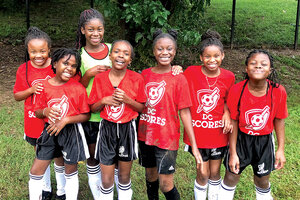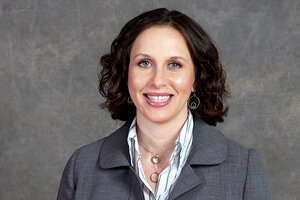How one woman is taking an after-school program to the big leagues

Middle-schoolers participate in DC Score’s soccer program. The nonprofit, which also emphasizes poetry and service, has a partnership with the Major League Soccer franchise D.C. United.
Courtesy of DC Scores
Washington
Schoolteacher Julie Kennedy was working at an elementary school in Washington in the early 1990s when she noticed time and again that a number of her fifth-grade girls were hanging out on street corners after school.
A soccer player, Ms. Kennedy invited them to join her for a match or two in the hours following class. Her informal after-school program was a hit, and the students kept coming back – even well into the winter. So Kennedy turned to her love of poetry, inviting the girls to join her for some creative writing.
This is how DC Scores, an after-school program in Washington, got its start. Officially launched in 1994, the nonprofit has grown from its small group of girls to now involve 3,000 students – boys included – each day. It still focuses on soccer and poetry, and as part of its diverse offerings that have become a signature blend, it also emphasizes service. The range of programming helps children build confidence and have the tools needed for future success.
Why We Wrote This
Giving children opportunities to learn outside of school is a known key to their future success. One teacher’s efforts to keep her own students off street corners has now grown to reach 3,000 D.C.-area kids.
Bethany Rubin Henderson has been the organization’s executive director since 2014. She brings a background in law, experience in government initiatives like My Brother’s Keeper, and an aptitude for Ultimate Frisbee. She’s credited with an expansion of DC Scores that has brought the organization’s benefits to more children in need.
“We are about giving [children] chances to succeed, and soccer, poetry, and service learning projects are such great on-ramps for that,” Ms. Henderson says. “We really focus on building the team around those kids that helps them stay on track.”
Owing to its success, the DC Scores model has been replicated in cities across the United States since the late 1990s through America Scores. This separate nonprofit works on curriculum development and fundraising, and Henderson has been its president for the past two years.
DC Scores offers programming free of charge to children in 69 schools and recreation centers in Washington. The objective is to meet the children where they are, with no barriers to access in the way of transportation and cost. In fact, Henderson says, the organization has significantly increased the number of aftercare seats in the District of Columbia, which does not have universal aftercare programming.
Each school commonly has four DC Scores coaches – two for soccer and two for poetry and service – who are frequently school staff members the nonprofit hires for a “second shift.”
DC Scores works with children in communities confronted with “disproportionate challenges,” Henderson says, such as high rates of poverty and violence. And in the schools that the nonprofit works with, roughly three-quarters of the children are not on grade level in reading or math, according to the organization.
“Many of our kids aren’t lucky enough to have consistent, safe people in their home environment. And our coaches are those people,” says Henderson. The youths “are being mentored by an adult who understands their environment, an adult they bump into in the halls or on the streets or at the corner store. They are being mentored by an adult who knows their peers.”
One of these coaches is Mark “Popsie” Lewis, who has been with the organization since 2009. “I see a lot of kids that gain confidence starting with our classroom setting during poetry and community service learning classes, [and] that confidence transfers to the soccer field and a lot of times into their daily routine and life,” Mr. Lewis says in an email interview. “DC Scores allows kids to have fun in a safe space while experiencing growth.
Neighborhood teams
The activities take place year-round: The fall includes 12 weeks of soccer, poetry, and creative writing; winter has six weeks of soccer and nutrition programming; the spring consists of 12 weeks of soccer and service; and summer features eight weeks of soccer and arts enrichment.
All participants engage in each of the main components of the program, Henderson says, which helps build a variety of skills. And there aren’t prerequisites.
“You don’t need any particular body type or skill set, or really even equipment, to play soccer. You don’t need anything for poetry besides a pencil and something to write on, [and] service learning is about agency. They create something from nothing,” she says.
Each child at DC Scores is part of a neighborhood team. This fosters strong bonds among the participants, Henderson says.
“Kids join their DC Scores team. That same team plays soccer [and] writes and performs original poetry and spoken word together,” she says. “And that same team takes those issues they were talking about and turns them into action.”
Henderson recounts seeing a young man bragging about the soccer skills of a teammate, who in return praised the young man’s poetry.
“Those authentic relationships, those bonds, that trust, that encouragement – that’s really what we are about,” she says. “We use that neighborhood team model because it reinforces those values, those tools, those skills that we are teaching the kids.”
The organization’s service component is distinctive. Participants explore issues in their community, conduct research, plan a project, execute the work, and reflect on the results. Service projects tend to vary by age group and involve issues that are meaningful to the children, ranging from cleanup projects to community gardens, food drives to immigration marches. Some youths have gone as far as organizing a sexual assault education program, while others have visited a senior center to teach residents how to email and text-message their friends and loved ones.
Before coming to DC Scores, Henderson held a variety of positions in the social, for-profit, and public sectors. She began her career working for the City of New York and practiced law for a number of years. In 2008, she founded City Hall Fellows, a college service corps program designed to prepare young people for engagement in civic leadership. She was also a White House fellow, serving during the Obama administration and working not only on My Brother’s Keeper but also on other projects including the 2013 Youth Jobs+ initiative.
“I think of myself as a lawyer by training, a social entrepreneur by trade,” she says, noting that at the conclusion of her White House service, she wanted to return to a job at the local level. “I really missed working directly where policies become programs.”
As an athlete herself – Henderson competed nationally in Ultimate Frisbee in college and afterward – she was struck by the model of DC Scores. “It was a really great opportunity to work on issues I care about at the local level using intervention tools and techniques that I really believe in,” she says.
Henderson sees the effect that DC Scores has on its participants, and she sees youths continuing to come back to the program. According to data from the nonprofit, after a 12-week DC Scores period, 83 percent of participants had improved their aerobic capacity, and 99 percent were confident they would graduate from high school. After a year, 96 percent could identify something they were good at.
D.C. United
Several years ago, Henderson brokered a new partnership between DC Scores and D.C. United, a Major League Soccer franchise. As D.C. United’s “official community partner,” DC Scores youth participants attend games, meet players and coaches, and see their poetry printed in game-day programs. “For our kids, that’s really powerful,” Henderson says. “It connects them to something bigger than themselves.”
The partnership has also elevated the nonprofit’s brand profile, which has contributed to the tripling of participants over the past six years. During that same period, the organization’s waiting list has doubled. “There is more demand just in the district than we can meet,” she says.
The D.C. United partnership has helped make fundraising easier for the nonprofit. The organization’s $2.5 million annual budget is supported by government funding, donations from individuals, and grants.
Andy Bush, chief revenue officer for D.C. United, sees the collaboration as a win-win. While the team has worked with DC Scores for some time, officials are now trying to deepen the relationship.
“We will be using our new stadium to help promote all the amazing work they do,” says Mr. Bush in an email interview. “Every transaction in our stadium will give fans the opportunity to donate and support DC Scores.”
He is keen on what DC Scores has done for young people in the nation’s capital. “They very much integrate into the schools [that] need the most help and they don’t give up,” he says.
He describes Henderson as an “incredible and diverse thinker, and completely committed to raising the profile of the organization.”
For Henderson, the mission of DC Scores is also personal. She has her own elementary school-age children, and she sees the opportunities available to them in comparison to what program participants have growing up.
“It’s night and day, and it’s not fair,” she says. “Every kid should have the same opportunity.”
• For more, visit dcscores.org.
Three other groups that engage children
UniversalGiving helps people give to and volunteer for top-performing charitable organizations around the world. All the projects below are vetted by UniversalGiving; 100 percent of each donation goes directly to the listed cause.
• Stone Soup Leadership Institute develops initiatives and educational tools to enable young people to become community leaders. Take action: Sponsor an underserved youth so he or she can attend a summit organized by this group.
• Giraffe Heroes Project encourages people to stick their necks out for the common good and gives them tools to solve public problems. Take action: Financially support this organization’s involvement with children.
• BRAC USA aims to empower those dealing with poverty, illiteracy, disease, or social injustice. Take action: Pay for a safe space for a Rohingya child who has been forcibly displaced.

